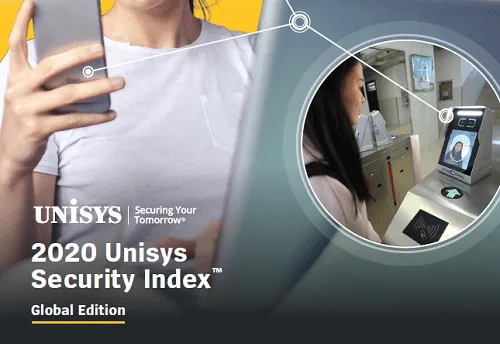EXECUTIVE SUMMARY
The Unisys Security Index™️ has tracked global security concerns for 14 years. Overall, the world remains on edge – global security concerns are at their highest level since the first Unisys Security Index in 2007.
With a score of 175 out of 300, the 2020 Unisys Security Index remains at a historical high. Almost all (99%) respondents have at least one security concern out of the eight included in the survey. However, there are notable shifts in focus owing to the emergence of the COVID-19 global health crisis.
Internet Security is now the lowest concern among consumers, after having been steadily on the rise since 2017 and finishing as the area of second-most concern in both 2018 and 2019.
Meanwhile, both National Security and Personal Security have moved up the agenda, driven by a rise in concerns about Personal Safety, which has increased by 9 percentage points to 58% seriously concerned, and concern about Epidemics/Disasters, which not surprisingly has increased by 8 percentage points to 62% seriously concerned.
Consumer worries about all other security concerns fell since 2019.
Consumers are narrowing their attention during COVID-19 to their families’ health (67% seriously concerned), as well as to their country’s economic stability (66%) and health infrastructure (64%). In contrast, Internet Security issues such as the risk of being scammed (45% seriously concerned) or experiencing a data breach while working remotely (41%) are the least concerning risks relating directly to the pandemic. This is despite both a rapid push to remote work for millions of people and mounting evidence that phishing, scamming and hacking are rising dramatically during the pandemic. In this sense, consumers appear to be taking their eye off the ball when it comes to security concerns beyond health and economic well-being, putting themselves and potentially their employers at risk.
Consumers’ change in focus – moving from Internet Security concerns toward those of Personal and National Security – is reflected in attitudes toward data sharing. More than three-fifths (61%) say they are willing to share their location data so the police can find them in an emergency. However, consumers are clear that data sharing is only acceptable if it is for the right reason and with a trusted organization.
For the fourth consecutive year, Identity Theft and Bankcard Fraud are the two most pressing concerns worldwide, despite dropping from 2019 levels. Concern around Identity Theft dropped by four percentage points since 2019 but continues to rank at the top of the eight security concerns measured by the index. Women and young people under 35 are the most concerned demographic groups globally. Six of the top seven countries most concerned about security are developing economies, with security concerns having increased the most in Brazil and Chile since last year.


